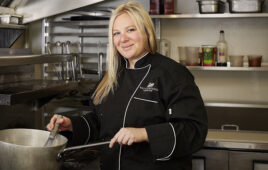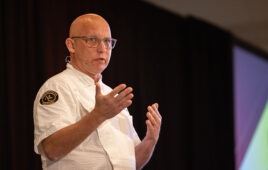Drew Tait, Executive Chef of Kelly Greens G&CC, has developed an extensive leadership philosophy he hopes will elevate his culinary team, his club and himself.
As chefs, we’ve all read many books and articles on leadership. It’s important to always continue to develop our skills as successful and effective leaders. One area I have recently focused on is creating the right environment to allow my team to be successful and foster their individual leadership skills.
At Kelly Greens Golf and Country Club (Fort Myers, Fla.) I’m fortunate to have a team in my kitchen I trust to make some really wonderful food. Some of them have come to work with me from past properties and others were here years before me. They work well together and produce amazing food in a timely manner with the utmost of accuracy. We have overcome many challenges over the last year and a half, but they still need guidance, direction, feedback and positive reinforcement to keep them moving toward their next level of greatness.
At the end of the day, regardless of how great your team is, I believe that a majority of success or failure in F&B comes down to how we as chef leaders interact with our staff. 90% of all issues from can be traced back to the leader’s actions and decisions. Did you hire the right person? Did you train them properly? Did you communicate clearly? Did you explain the task in a way that they understand? Was another department involved that caused an issue? Or was there a problem with the equipment? All of the answers to these questions go back to the leader, not the line cook.
Most chefs say, “My cooks don’t listen.” Or “My cooks are lazy,” but the next time you think this, try looking at it from the perspective. Ask yourself, “What can I do differently to make this work better?” Or “How can I present this information differently to communicate it more clearly to my team?” This introspective process helps improve the environment where a team can thrive and reach their full potential. It also promotes certain team members to take on leadership roles well before they are ever given the opportunity to be responsible for others.
My goal in creating this environment here at the club is to help promote communication, foster creativity, hold each other accountable, make my staff confident in their own skills and get them to see the big picture of running a professional kitchen. Some of my bedrock principles for creating the right environment are:
- Having an open door policy and never saying no if someone wants to talk. Even if I have to follow back up with them hours later, I always try to make sure that they feel comfortable sharing their concerns in a productive way. It’s important to push them to think through problems and to see all challenges from multiple viewpoints before deciding on a course of action. This helps them to be open and honest with me so we can always produce the best food & beverage experience for our members.
- Use daily stand up meetings to communicate my vision and goals clearly and consistently. These meetings are held every day at shift change when the lunch and dinner crews are both here. I have a form that I fill out that consists of the following sections:
- RECAP OF PREVIOUS STANDUP/ OUTSTANDING ISSUES
- NEW ACTION ITEMS
- PREVIEW & REVIEW OF BUSINESS: (groups, changes in members profiles, anticipated business levels)
- RECOGNITION (AOM nominees, winner, rewards)
- MEMBER FEEDBACK (review & kudos)
- UPCOMING CLUB TRAINING
- CLUB UPDATES (updates on projects, hours of operation changes)
- SAFETY(concerns, daily food safety question)We cover all of the items above along with daily specials and any other topics that need to be communicated to the team. We are also about to roll out a daily cooking tip calendar that will go hand in hand with our daily food safety calendar. My sous chef will setup a quick demo of items, like how to properly use a rubber spatula, how to properly store herbs or how to fix a broken cream sauce. We also ask a different food safety question each day to keep them on their toes regarding this topic. These standups set the tone for the dinner shift and give the lunch shift things to work on for the next day. On the back page of the form, I have an area where each team member signs and prints their names. This gives them ownership of the items contained in the form and allows me to hold those accountable who say they were not aware of something we went over at standup the day before.
- Never scream, yelling or show disrespect toward anyone. I worked for screaming, yelling, pan and plate throwing chefs my entire career. I told myself that when I had the opportunity to be the chef, I would not treat my staff like this. Many times I saw men and women frozen in fear while being torn down in front of others. This created an environment of the kitchen team versus the chef. It was mostly controlled by fear, fear of either disappointing or pissing the chef off. I was convinced I could be a more effective leader by treating others how I wanted to be treated without losing an ounce of respect from my team. Now with a younger work force coming online, it is absolutely necessary to control your anger to be successful. I fully believe that when we let our emotions like anger, disappointment or sadness cloud our judgment, we make poor decisions. I do my best to stay even keeled and calm even during the busiest services and I focus on making fact and data driven decisions. This does not mean that my team and I do not work with a sense of accuracy and urgency. My sous chef and I set the tempo and tenner of the kitchen leading from the front with our tone, actions and clearly communicated commands.
- Taking plenty of time to do yearly reviews properly. Even if your employer does not require them I believe it is one of the few opportunities in our business to provide feedback in a clear, precise, positive and constructive manner. If you take the time to invest in preparing a great review it can have an impact on your team for the entire year. Keep them focused on how they can improve as opposed to what they’ve done poorly. You can use examples of poor decisions they made, but always end on a positive, constructive note. To make this easier keep notes throughout the year on each team member along with an attendance record. These will be vital to preparing a review that is impactful and based on facts not feelings.
- Get your team out of the kitchen and focus on learning and team building. This summer at Kelly Greens we have a calendar that I created that shows dates of our planned field trips, team building exercises and trainings. This allows the team to know what is planned, when and where so they can plan vacations around our trips. We have four different field trips planned to our seafood, produce and mainliner vendor’s facilities. We’re visiting a tomato grading facility, specialty produce facility, meat processing facility, test kitchen facility and observing our local seafood companies normal fish processing for the week. We also have a trip planned to a food show along with a team building exercise at an Escape Room puzzle between our FOH & BOH teams. These trips allow our teammates to get out of their comfort zone, learn something new and to see their fellow team members in a different light. This helps to promote communication and respect within the team along with exposing them to the big picture of how the food we use is processed, handled and delivered to our kitchen. The last event we have on our calendar before our busy season begins is a 5 day stretch of training and retraining. This is important to do after our other team building exercises as this will be the time when we use the different skills we’ve developed during the off-season to produce better, more exciting and creative food experiences for our members. We will train new associates in their areas of the kitchen along with giving refresher trainings for all existing team members’ positions. This helps to get everyone on the same page, working toward the same goal with a full understanding of how we achieve success.
So the next time you pick up a book on leadership or team building, think about the environment you’re creating in your kitchen. Is it a positive environment? Are you and your team members happy? Are you getting the results you want? If not, it’s time to reflect on your own actions to see what you can do as a leader to create the right environment that allows you and your team to succeed.




